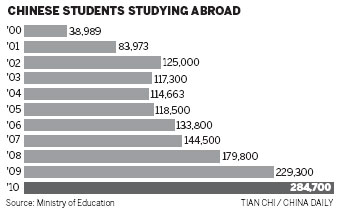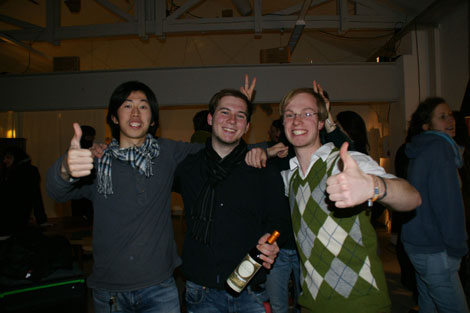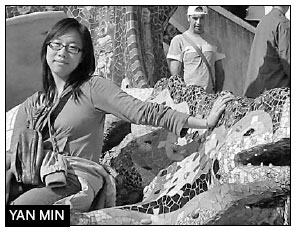Society
Schooled to adapt
Updated: 2011-05-04 07:58
By Guo Shuhan (China Daily)

As record numbers of Chinese students study abroad, their difficulties adjusting to foreign cultures are revealed. Guo Shuhan reports.
Zhang Xiaohan says she has been lonely studying in the United States for the past four years. The University of Oklahoma postgraduate student says she doesn't like going to bars and has no interest in watching American football games, which is what most of her fellow students do in their free time.
Instead, she prefers to attend gatherings of Chinese people and plays the piano at gala shows organized by the school's Chinese students union.
Zhang is one of the approximately 1.39 million Chinese students who have studied abroad since 1978, many of whom have found it more difficult to adapt to the lifestyles of local students than dealing with the language barrier.
In 2010, 284,700 Chinese students went abroad, an increase of 24 percent from the year before. Some of them fitted quickly into their new environment, while others found it difficult.
"Students studying abroad can gain the upper hand in job hunting. If they work hard, they can also start their careers abroad," says James Tan, founder of NIT Education, from which more than 3,000 Chinese high school graduates have moved to foreign universities in the past decade.
Tan says some students, however, turn the opportunity they are given into a failed life experience.
Besides language ability, Tan says good reading and thinking habits should be developed in advance. He says some Chinese students take a long time to adapt to studying abroad, where the teaching methods involve reading a wider range of reference books and writing essays frequently.
Tan, a former overseas student in Australia, says home-stays are a good way to understand local cultures. Moreover, communicating with locals through social activities helps them find their feet in new surroundings.
He says Chinese students should concentrate on schoolwork rather than do part-time jobs. Some students, he says, want to prove they can live independently by earning money.
He also suggests students research information about their host country and its culture via the Internet and other channels.
Here are four accounts of Chinese youngsters, including Zhang, who have studied in Japan, France, Germany and the United States - which are among the top 10 foreign study destinations for Chinese students.
|
 Freshman at Bauhaus-University Weimar in Germany. Majoring in product |
For Weng Xinyu, Germans are only moderately friendly and hospitable. He says they are polite, often smile and give each other hugs, and even strangers say hello on the streets, but nevertheless, most of them tend to be "indifferent".
This upset Weng to begin with, until he understood that Germans are typically reserved and respect privacy.
"They think people are free to share or not share their feelings. They never impose ideas on others, which eventually made me feel comfortable," Weng says. "They seldom invite others to join in, but they are fairly welcoming if you want to be a part of the group."
Compared with German people's logical thinking style, Weng says he is more likely to shift views and give up on a problem. His German classmates, on the other hand, would ponder a problem for days to solve it.
The 24-year-old says the atmosphere in class was quite serious, but he has adapted and learned to concentrate in class and enjoy himself afterward.
He says he has become more efficient with scheduling and time management. He tries to keep up socially with local students, but finds late-night parties upset his biological clock.
Postgraduate at the University of Oklahoma in the United States. Majoring in chemical engineering.
|
Postgraduate at the University of Oklahoma in the United States. Majoring in chemical engineering. |
Zhang Xiaohan is still scarred by the experience of her first bout of sickness just one month after arriving in the US.
She suffered a "horrible cough and fever of over 38 C", but was too angry to accept the prescription of just antipyretics to reduce the fever and a suggestion to relax. She requested an intravenous glucose drip, a common practice in Chinese hospitals, but was turned down by the doctor at her school hospital.
"I blamed the 'irresponsible' doctor, before I realized American doctors seldom treat patients with drips except in serious cases," the then 22-year-old says.
She also attributes the miserable experience to her poor language skills. She did not know how to describe her illness, nor could she understand the doctor's explanation of why she should not be given a drip.
Zhang says Americans like to express their personalities, while she prefers associating with people who are more modest.
She also misses China's crowds. Her school's city of Norman is relatively unpopulated, she says, and the state capital of Oklahoma City appears to be no more prosperous than many of China's small towns.
She also longs for Chinese food. She cooks at least one Chinese meal every day, usually frying vegetables with eggs, sausages or minced meat bought from Chinese supermarkets in Oklahoma City. Sometimes she makes dumplings or steamed buns with Chinese friends, or they drive to Chinese restaurants to satisfy their appetites.
Exchange student at WASEDA University in Japan in 2007. Majoring in international politics.
|
Exchange student at WASEDA University in Japan in 2007.Majoring in international politics. |
Huang Ting says some Japanese customs were a nightmare to begin with, although she enjoyed hearing the softly-spoken language of the locals.
Tokyo's high service industry standards were a pleasure to experience, she says, recalling one grocery shop keeper who handed her a tissue after some dripping water fell from her goods onto her hands.
Huang describes the city she stayed in as having a "rigid social structure" and says she was astonished to note all the women dressed in white overcoats, while the men were dressed uniformly in black. Huang, dressed in gray-blue, "a quite low-key color" in China's winter, says she stood out in Japan.
As a result, she rarely wore her red down jacket and avoided wearing bright colors in order to blend in. She even bought a white coat eventually.
The student was also amazed by the country's garbage sorting system. She says there were five different rubbish bins for plastics, glass, tin, milk cartons and leftovers in her dormitory's kitchen. There were even two rubbish bins in her room, for plastics and non-plastics.
Graduate of Essec Business School in France in 2011. MBA.
|
Graduate of Essec Business School in France in 2011. MBA. |
Yan Min says the "arrogant but creative nation" of France taught her that sometimes she should fight to express her ideas or show off her talents.
The English program student was assigned a law course in French in her first semester, which was too difficult for her because of her poor French-language skills. When Yan questioned the arrangement she was surprised to find the school authorities accepted her argument and she did not have to do the course.
"It was my first lesson. I was quite a soft and obedient girl, but (I found) I had to be tough to secure my own interests," the 26-year-old says.
Yan says she was depressed a lot of the time during the first year of studies.
Lacking business experience, she dared not speak out during brainstorming sessions. She says she was always the silent one during heated group discussions, although most of her classmates lacked practical knowledge as well. Things only improved after she did a six-month internship at a media company.
"It's a pity that it was only after one-and-a-half years that I finally started to contribute more to our group discussions," Yan says.
"I learned a lot from my creative classmates who could come up with interesting ideas. And I realized even fragmented ideas could be helpful to the discussions."
Yan says the culture shock was beneficial to her studies and current job as a marketing manager. Now, she says, brainstorming with colleagues is a fruitful way of producing ideas and improving working efficiency.
Specials

Sino-US Dialogue
China and the US hold the third round of the Strategic and Economic Dialogue from May 9-10 in Washington.

V-Day parade
A military parade marking the 66th anniversary of the Soviet victory over Nazi.

Revolutionary marriage
A newlywed couple sings revolutionary songs during their marriage.


